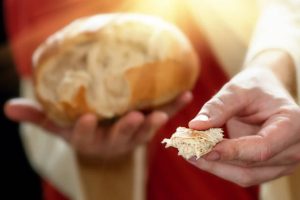10th Sunday after Trinity St Andrew’s Milngavie
Today we celebrated the tenth Sunday after Trinity accompanied by Abigail.
Next Saturday 10th August All Saints cake walk. 2pm from Mairi’s house, Ardbeg, at Easter Carbeth returning for tea afterwards. Flat walk on paths, although small sections are rather overgrown and uneven underfoot, bypass routes possible. Non walkers warmly welcome to tea.
This Week
Tuesday 10am – Prayer Group in the Garden Room.
Thursday 10am – Said Holy Communion followed by coffee in Friendship House
Readings for next Sunday – 11th Sunday after Trinity – 1 Kings 19:4-8 Ephesians 4:25-5:2 John 6:35,41-51

Today’s readings – Exodus 16:2-4,9-15, Ephesians 4:1-16, John 6:24-35
One of the occupational hazards of having a house full as we have had recently is the constant need to go to the supermarket. Of course, we are so fortunate in our country that our shops are usually very well stocked, and what a variety of food is available! Many nationalities are represented on our shelves. Recipes, that not that many years ago would have been unheard of, now pass for normal.
However not all of us readily embrace different food. Some of us can remain suspicious of strange foods or decide we don’t like certain things.
In the OT reading today the people of Israel have had enough of their life in the wilderness. They may have lived in slavery while in Egypt, but at least they had had enough to eat there. Freedom, they realised had come at the prize of uncertainty and hardships. The new life God had led them into was strange, unfamiliar, maybe even frightening. They were hungry and needed food. And so, they grumbled and complained to Moses.
God listens to the complaint and provides a mysterious substance. And, like many who are confronted with unfamiliar food for the first time, they ask, “What is this?”
The people in the wilderness see the manna, see that it is the promised food from God, and still don’t recognize it as such. It seems they were waiting for something familiar, something they knew; and yet, God totally catches them off guard and surprises them by providing what is needed in an unexpected way.
But God does work in unexpected ways. How often do we think our prayers go unanswered, when God just might be moving in a way we don’t expect it? How often do we think we don’t get what we need, when God is actually providing it, and we just don’t recognize it as the thing we need? How often do we reject what God has to offer, because it is not what we want?
Last Sunday’s gospel from John talked about Jesus miraculously feeding the 5,000. Today’s gospel is closely connected to that; the people in the Galilean countryside are still following Jesus; they were fed once, and, as Jesus realizes, they’ve come for more. They are still hungry. They probably don’t quite know themselves what they are hungry for, or what they really need.
“Very truly, I tell you, you are looking for me, not because you saw signs, but because you ate your fill of the loaves,” he says to them.
The people may be concerned for their bellies, but Jesus is concerned for their lives. The people want to feed themselves with bread, Jesus wants to feed them with God. “Do not work for the food that perishes,” he tells them, “but for the food that endures for eternal life.”
The food that endures is Jesus himself. He is the bread that is broken and distributed for the life of the world. He is the bread that is broken and yet never divided. He is the bread that is eaten and yet never exhausted.
When we believe in Jesus, eating, ingesting, and taking him into our lives, we live in a sense differently. We see ourselves and one another as persons created in the image and likeness of God rather than simply earthly beings. We trust the silence of prayer rather than the words of argument. We choose love and forgiveness rather than anger and retribution. We relate with intimacy and vulnerability rather than superficiality and defensiveness. We listen for God’s voice rather than our own. Ultimately, in the light of the resurrection, we seek life rather than death.
Jesus came to his followers according to their need. Jesus knew them well and recognised their motives but did not judge them accordingly. Instead, he offered them a vision of life and its expectations, a new vision of God. They had originally followed him because they were physically hungry. Now they were ready for something beyond the physical. He offered himself as their salvation, which he spoke of in terms they would understand. Their new hunger could only be met by a new bread. Jesus would be this bread. With him as their bread, he would not only satisfy their temporary needs but would fill them with a new life.
“I am the bread of life,” Jesus tells the people. “Whoever comes to me will never be hungry, and whoever believes in me will never be thirsty.” He is offering the people himself. He is the imperishable bread that nourishes and sustains imperishable life.
Jesus makes us the same offer. He offers himself to us in every one of our relationships: family, friends, strangers, those who agree with us, and those who disagree. In every situation and each day of our life we choose the bread we will eat, perishable or imperishable. In so doing we also choose the life we seek.
